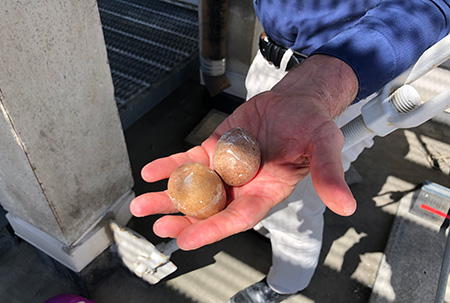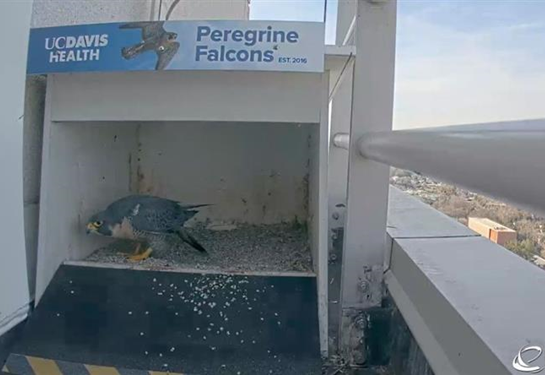Eggs-quisite! peregrine falcons have returned
Guess when the first Peregrine Falcon egg will hatch and win the chance to name the chicks
UC Davis Medical Center’s peregrine falcon parents have returned for another season, and they have already laid eggs! The incubation period for peregrine falcons is usually 33-35 days. If the chicks hatch successfully, the peregrine hatchling(s) will emerge from their eggs as furry white fluffs in late April.

Since at least 2015, a pair of peregrine falcons has called UC Davis Medical Center’s roof home. Their nest is located a safe distance from the hospital’s helipad. It will be home to the birds where they can comfortably nurture their newborn chicks through June.
Read about our peregrine falcon family's history by checking out the highlights of the past four seasons and stay tuned to the video livestream to keep up with the peregrines of UC Davis Medical Center.
Name the peregrine falcon chicks
This year, UC Davis Health is holding a contest to see who can guess when the first Peregrine Falcon egg will hatch. For those of you who want to get precise with their predictions, we are going to define “hatching” as the first moment that a moderator sees the first chick’s full head clear out of the egg.
The winner of this year's contest will win the opportunity to name the Peregrine Falcon chicks. We'd like to request that names be UC Davis-related.
Go here to enter your guess.
About peregrine falcons
Peregrine falcons are known as one of the world's fastest birds. When power-diving from great heights to strike their prey, the falcons can reach speeds of 200 mph.
At one time, the birds were on the federal list of endangered species. They also were one of the first birds placed on California's Endangered Species List. A ban on the insecticide DDT in 1972 helped the species recover enough so that the raptor could be removed from the federal list in 1999. Ten years later, peregrine falcons were removed from the state’s list.



